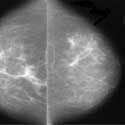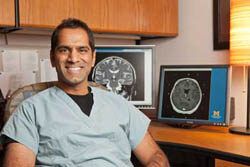Research News
-
Big head, bad health
Study: Even though narcissists have grandiose self-perceptions, they also have fragile views of themselves, and often resort to aggression when their sense of superiority is threatened,
-
A cancer Catch-22
The drugs Avastin and Sutent have been looked at as potential breast cancer treatments. But while they do shrink tumors and slow the time till the cancer progresses, the effect does not last, and the cancer eventually regrows and spreads. Now U-M researchers have discovered why—and what can be done about it.
-
An oboe for the brain
What do U-M profs, technology start – ups, and brain probes have in common?
-
Insect cyborgs may become first responders, search and monitor hazardous environs
A fascinating new invention could make it possible to use living insects, equipped with tiny battery packs and electronics, to enter hazardous environments and send back data and even video safely to first responders.
-
U-M divers retrieve prehistoric wood from Lake Huron
Under the cold clear waters of Lake Huron, U-M researchers have found a five-and-a-half foot-long, pole-shaped piece of wood that is 8,900 years old. It seems to have been carved by humans, and carried across a land bridge that no longer exists. The simple object may provide clues to long-enduring mysteries about Great Lakes history.
-
Physicists' 'light from darkness' breakthrough named a top 2011 discovery
The physicists directly observed, for the first time, light particles that flicker in and out of existence in the vacuum of space. They witnessed the long-predicted quantum mechanical phenomenon known as the dynamical Casimir effect. “One of the profound consequences of quantum mechanics is that we know that something can come from nothing,” said U-M’s Franco Nori.
-
Generation X: U-M survey paints positive portrait
Study: They’ve been stereotyped as a bunch of insecure, angst-ridden, underachievers. But most members of Generation X are leading active, balanced, and happy lives.
-
Michigan, the moon, and beyond
From even before the all-Wolverine crew of Apollo 15, the U-M College of Engineering has played a key role in American space flight.









